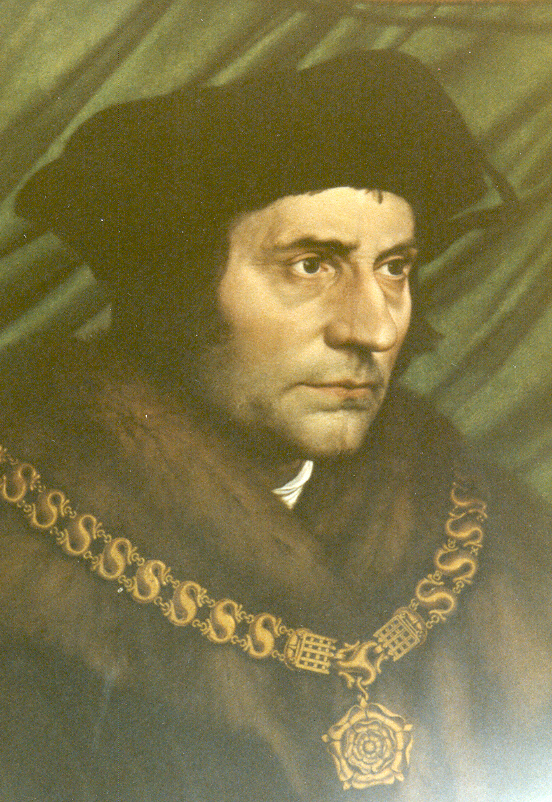Saint Thomas More
Feast day 22 June, Patron of
lawyers
by A. G.,
a high school student in Northern Virginia
Index of Saints By Students
Home Page

Thomas More was born on
February 7th, 1478 in London, England. At the age of thirteen, Thomas was placed in the household of
Cardinal Morton, Archbishop of Canterbury then Lord Chancellor of England. Here, his wonderful character and intellect
attracted the attention of the archbishop, who sent him to Oxford in 1492 where
he excelled in languages. Beside the
Greek and Latin classics, Thomas studied French, history, mathematics, and
learned to play the flute and violin.
After two years at Oxford, Thomas went to school in London to study law.
His ability in law attracted the attention of the governors of
the school at Lincoln's Inn who appointed him chief lecturer on law. Although
this was a one year position, his lectures were so well received that his
appointment was renewed for three successive terms.
For a time, Thomas considered entering the priesthood. His
home was near the London Charterhouse and he often joined in the spiritual
exercises of prayer and penance with the monks there. Both the Carthusian and
the Franciscan Order seemed attractive because of the strictness of their rules
of life. In the end, he decided against the religious vocation and decided to
follow law.
In 1501, Thomas was elected a member of Parliament, the governing body in England. He took his work seriously and discovered that King Henry VII was unjustly demanding large sums of money from his subjects. Thomas convinced Parliament to reduce the payment to the king in spite of the king’s objections and anger.
Thomas married Jane Colte in 1505, and from this union they had four children; Margaret, Elizabeth, Cecilia, and a son, John. His wife died after six years, and almost immediately Thomas married Alice Middleton his housekeeper, who offered his children her love and attention.
After the death of Henry VII, the new king, Henry VIII, was
very familiar with Thomas' good character and talents. He was given the
position of Under-Sheriff of London, and later was chosen by Cardinal Wolsey to
defend the interests of English merchants in Flanders. During this period of
six months, he began writing his book, "Utopia" which describes the inner
workings of an ideal state.
Both Cardinal Wolsey and the new King Henry VIII were anxious
to secure Thomas' services at the royal court, and were influential in granting
Thomas a pension of 100 pounds for life. He was quickly made Privy Councilor,
knighted, made sub-treasurer to the King, elected Speaker of the House of
Commons and High Steward of Cambridge University.
In 1529, Thomas succeeded Cardinal Wolsey as Chancellor of England, a post never before held by a layman. But the king's first marriage to Catherine of Aragon produced no male heirs to the throne. The king asked the pope to approve his planned divorce to marry Anne Boleyn. This was never approved, but the king went ahead with his plans, and forced the Parliament to grant him the authority to demand the English clergy recognize him as “Protector and Supreme Head of the Church in England.
Thomas saw the coming difficulties and resigned his post of
Lord Chancellor of England which he had held for less than three years. This
left Thomas with no income, and his 100 pounds a year pension was denied him.
His only income was the rent from some property he owned. With no work, his
family was gradually reduced to poverty and forced at times to resort to
begging.
Because he was still a public figure, Thomas was brought
before members of a specially appointed council which asked why he had spoken
against the king's position against the pope. He answered that he had several
times explained his feelings to the king in person without incurring his
displeasure. In March of 1534, Parliament passed the Act of Succession
requiring that all citizens take an oath acknowledging the king's marriage as
legal and any children to be legitimate heirs to the throne. On April 14th,
More was summoned to take the oath. He refused and four days later, was
arrested and confined to the Tower of London under the charges of treason.
While confined in prison, most of his time was given up to
prayer and penitential exercises. On July, 1st, 1535, More was
indicted for high treason at Westminster Hall before a special commission
of his own colleagues. The jury found him guilty and he was sentenced at
first to be hung, but the sentence was changed to beheading.
The execution took place on Tower Hill on July 6th,
1535, and his head was displayed on London Bridge for a month. It was finally
obtained by a sympathetic family and kept in their burial vault at St. Dunstan's
in Canterbury. More was declared to be a saint in heaven in 1935.
In conclusion, More was a well-educated man who vigorously
lived the word of God with his whole heart. Because of his excellent education,
he became a very good writer and held many political offices. He worked hard
for what he believed was right and fought strongly against
what he believed was wrong. He
lived his convictions that God had a place in the affairs of men and died as he
lived, "The king's good servant - but God's first."